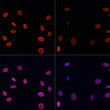| Post Translational Modifications | Acetylation at Lys-6 (H4K5ac), Lys-9 (H4K8ac), Lys-13 (H4K12ac) and Lys-17 (H4K16ac) occurs in coding regions of the genome but not in heterochromatin. Acetylated as part of spermatogenesis progression prior to histone-to-protamine exchange. Citrullination at Arg-4 (H4R3ci) by PADI4 impairs methylation. Monomethylation and asymmetric dimethylation at Arg-4 (H4R3me1 and H4R3me2a, respectively) by PRMT1 favors acetylation at Lys-9 (H4K8ac) and Lys-13 (H4K12ac). Demethylation is performed by JMJD6. Symmetric dimethylation on Arg-4 (H4R3me2s) by the PRDM1/PRMT5 complex may play a crucial role in the germ-cell lineage. Monomethylated, dimethylated or trimethylated at Lys-21 (H4K20me1, H4K20me2, H4K20me3). Monomethylation is performed by KMT5A/SET8. Dimethylation and trimethylation is performed by KMT5B and KMT5C and induces gene silencing. Monomethylated at Lys-13 (H4K12me1) by N6AMT1.H4K12me1 modification is present at the promoters of numerous genes encoding cell cycle regulators. Acetyl-methylated at Lys-6 and Lys-13 (H4K5acme and H4K12acme, respectively), acetyl-methylation is an epigenetic mark of active chromatin associated with increased transcriptional initiation. Acetyl-methylation is formed by acetylation by EP300/p300 of lysine residues that are already monomethylated on the same side chain. H4K5acme and H4K12acme marks specifically bind BRD2. Phosphorylated by PAK2 at Ser-48 (H4S47ph). This phosphorylation increases the association of H3.3-H4 with the histone chaperone HIRA, thus promoting nucleosome assembly of H3.3-H4 and inhibiting nucleosome assembly of H3.1-H4. Ubiquitinated by the CUL4-DDB-RBX1 complex in response to ultraviolet irradiation. This may weaken the interaction between histones and DNA and facilitate DNA accessibility to repair proteins. Monoubiquitinated at Lys-92 of histone H4 (H4K91ub1) in response to DNA damage. The exact role of H4K91ub1 in DNA damage response is still unclear but it may function as a licensing signal for additional histone H4 post-translational modifications such as H4 Lys-21 methylation (H4K20me). Ubiquitinated.by PHF7. Ufmylated.monofmylated by UFL1 at Lys-32 (H4K31Ufm1) in response to DNA damage. Sumoylated, which is associated with transcriptional repression. Crotonylation (Kcr) is specifically present in male germ cells and marks testis-specific genes in post-meiotic cells, including X-linked genes that escape sex chromosome inactivation in haploid cells. Crotonylation marks active promoters and enhancers and confers resistance to transcriptional repressors. It is also associated with post-meiotically activated genes on autosomes. Butyrylation of histones marks active promoters and competes with histone acetylation. Glutarylation at Lys-92 (H4K91glu) destabilizes nucleosomes by promoting dissociation of the H2A-H2B dimers from nucleosomes. Lactylated in macrophages by EP300/P300 by using lactoyl-CoA directly derived from endogenous or exogenous lactate, leading to stimulates gene transcription. Delactylated by SIRT3 at Lys-17 (H4K16la). |
| Function | Core component of nucleosome. Nucleosomes wrap and compact DNA into chromatin, limiting DNA accessibility to the cellular machineries which require DNA as a template. Histones thereby play a central role in transcription regulation, DNA repair, DNA replication and chromosomal stability. DNA accessibility is regulated via a complex set of post-translational modifications of histones, also called histone code, and nucleosome remodeling. |
| Protein Name | Histone H4 |
| Database Links | Reactome: R-HSA-110328Reactome: R-HSA-110329Reactome: R-HSA-110330Reactome: R-HSA-110331Reactome: R-HSA-1221632Reactome: R-HSA-171306Reactome: R-HSA-1912408Reactome: R-HSA-201722Reactome: R-HSA-212300Reactome: R-HSA-2299718Reactome: R-HSA-2559580Reactome: R-HSA-2559582Reactome: R-HSA-2559586Reactome: R-HSA-3214815Reactome: R-HSA-3214841Reactome: R-HSA-3214842Reactome: R-HSA-3214847Reactome: R-HSA-3214858Reactome: R-HSA-427359Reactome: R-HSA-427389Reactome: R-HSA-427413Reactome: R-HSA-4551638Reactome: R-HSA-5250924Reactome: R-HSA-5334118Reactome: R-HSA-5578749Reactome: R-HSA-5617472Reactome: R-HSA-5625886Reactome: R-HSA-5693565Reactome: R-HSA-5693571Reactome: R-HSA-5693607Reactome: R-HSA-606279Reactome: R-HSA-68616Reactome: R-HSA-69473Reactome: R-HSA-73728Reactome: R-HSA-73772Reactome: R-HSA-8936459Reactome: R-HSA-8939236Reactome: R-HSA-9018519Reactome: R-HSA-912446Reactome: R-HSA-9609690Reactome: R-HSA-9610379Reactome: R-HSA-9616222Reactome: R-HSA-9670095Reactome: R-HSA-9710421Reactome: R-HSA-977225Reactome: R-HSA-9821002Reactome: R-HSA-9821993Reactome: R-HSA-9841922Reactome: R-HSA-9843940Reactome: R-HSA-9843970Reactome: R-HSA-9845323 |
| Cellular Localisation | NucleusChromosomeLocalized To The Nucleus When Acetylated In Step 11 Spermatids |
| Alternative Antibody Names | Anti-Histone H4 antibodyAnti-H4C1 antibodyAnti-H4 antibodyAnti-A antibodyAnti-H4FA antibodyAnti-HIST1H4A.H4C2 antibodyAnti-H4 antibodyAnti-I antibodyAnti-H4FI antibodyAnti-HIST1H4B.H4C3 antibodyAnti-H4 antibodyAnti-G antibodyAnti-H4FG antibodyAnti-HIST1H4C.H4C4 antibodyAnti-H4 antibodyAnti-B antibodyAnti-H4FB antibodyAnti-HIST1H4D.H4C5 antibodyAnti-H4 antibodyAnti-J antibodyAnti-H4FJ antibodyAnti-HIST1H4E.H4C6 antibodyAnti-H4 antibodyAnti-C antibodyAnti-H4FC antibodyAnti-HIST1H4F.H4C8 antibodyAnti-H4 antibodyAnti-H antibodyAnti-H4FH antibodyAnti-HIST1H4H.H4C9 antibodyAnti-H4 antibodyAnti-M antibodyAnti-H4FM antibodyAnti-HIST1H4I.H4C11 antibodyAnti-H4 antibodyAnti-E antibodyAnti-H4FE antibodyAnti-HIST1H4J.H4C12 antibodyAnti-H4 antibodyAnti-D antibodyAnti-H4FD antibodyAnti-HIST1H4K.H4C13 antibodyAnti-H4 antibodyAnti-K antibodyAnti-H4FK antibodyAnti-HIST1H4L.H4C14 antibodyAnti-H4 antibodyAnti-N antibodyAnti-H4F2 antibodyAnti-H4FN antibodyAnti-HIST2H4 antibodyAnti-HIST2H4A.H4C15 antibodyAnti-H4 antibodyAnti-O antibodyAnti-H4FO antibodyAnti-HIST2H4B.H4C16 antibodyAnti-H4-16 antibodyAnti-HIST4H4 antibody |
Information sourced from Uniprot.org












